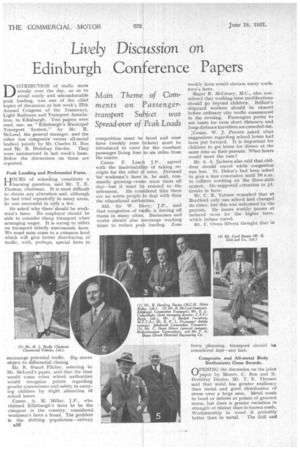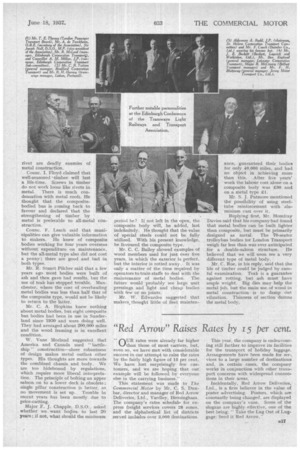Lively Disc ssion on Edinburgh Con erence Papers
Page 50

Page 51

If you've noticed an error in this article please click here to report it so we can fix it.
Main Theme of Corn rnents on ass en ger
transport Su ject was Spread-over of Peak Loads
DESTRIBUTION of traffic more evenly over the day, so as to avoid costly and uncomfortable peak loading, was one of the chief topics of discussion at last week's 27th Annual Congress of the Tramways, Light Railways and Transport Association, in Edinburgh. Two papers were read, one, on " Edinburgh's Municipal Transport 'System," by Mr. R. McLeod, the general manager, and the other (on composite versus all-metal bodies) jointly by Mr. Charles H. Roe and Mr. B. Homfray Davies. They were summarized in last week's issue. Below the discussions on them are reported.
Peak Loading and Preferential Fares.
HOURS of schooling constitute a 'burning question, said Mr. T. E. Thomas, chairman. It is most difficult to obtain any alteration and, although he had tried repeatedly in many areas, he was successful in only a few.
He asked why there'should be workman's fares. No employer should be able to consider cheap transport when' arranging wages. It is wrong to inflict on transport utterly uneconomic fares. We must soon come to a common level which will give better distribution of traffic, with, perhaps, special fares to encourage potential traffic. Big stores object to differential closing.
Mr. R. Stuart Filcher, referring to Mr. McLeod's paper, said that the time would come when school authorities would recognize points regarding greater convenience and safety in carrying children by slight alteration of school hours.
Counc. A. M. Millar, J.P., who claimed Edinburgh's fares to be the cheapest in the country, considered workmen's fares a fraud. The problem is the shifting population—railway competition must be faced and zone fares (weekly zone tckets) must be introduced to cater or the constant passenger living four to six miles from the centre.
Counc. F. Leac J.P., agreed with the inadvisabiliity of taking receipts for the relief ,4 rates. Demand for workmen's fares lis, he said, constantly growing—sore want them all day—but it must b resisted to the uttermost. He con idered that there
1 are no worse people o deal with than the educational authorities. Aid. Sir W. Davy, J.P., said that congestion of traffic is forcing off trams in many cities Businesses and works should also rearrange working times to reduce pe4( loading. Zone weekly fares would obviate many workmen's fares.
Major R. McCreary, M.C., also considered that working-time modifications should go beyond children. Belfast's shipyard workers should he cleared before ordinary city traffic commenced in the evening. Passengers prefer to use buses for even short distances and long-distance travellers are crowded out. .:Counc. W. J. Perrett asked what suggestions regarding school hours had been put forward. It is important for children to get home for dinner at the same time as -their parents. What hours would meet the case?
Mr. A. A. Jackson also said that children should travel while congestion was less. St. Helen's had been asked to give a fare concession until 10 a.m. to colliers working on the three-shift system. He suggested attention to id. breaks in fares.
Mr. C. R. Tattam remarked that at Bradford only one school had changed its times, but this was welcomed by the parents. He issues weekly passes at reduced rates for the higher fares, which induce travel.
Mr. C. Owen Silvers thought that in town planning, transport should be considered first—not last.
Composite and All.metal Body Enthusiasts Cross Swords.
OPENING th,e discussion on the joint paper by Messrs. C. Roe and B. Homfray Davies, Mr. T. E. Thomas said that wood has greater resiliency than metal and good distribution of stress over a large area. Metal tends to bend or deform at points of greatest stress, but there is greater variation in strength of timber than in known steels. Workmanship in wood is probably better than in metal. The drill and
rivet are deadly enemies of metal construction.
Counc. I. Floyd claimed that well-seasoned • timber will last a life-time. Screws in timber do not work loose like rivets in metal. There is much condensation with metal roofs. He thought that the compositebodied bus is coming back to favour and declared that the strengthening of timber by metal is preferable to all-metal construction.
Come. F. Leach said that municipalities can give valuable information to makers. He knew of composite bodies working for four years overseas without expenditure on maintenance, but the all-metal type also did not cost a penny ; there are good and bad in both types.
Mr. R. Stuart Pitcher said that a few years ago most bodies were built of ash and then gave had results, hut the use of teak has stopped trouble. Manchester, where the cost of overhauling metal bodies was less than half that of the composite type, would not be likely to return to the latter.
Mr. C. A. Hopkins knew nothing about metal bodies, but eight composite bus bodies had been in use in Sunderland since 1930 and were doing well. They had averaged about 200,000 miles and the wood framing is in excellent condition.
W. Vane Morland suggested that America and Canada used " battleship" construction—sheer robustness of design makes metal outlast other types. His thoughts are more towards the combined chassis. and body. We are too hidebound by regulations, which require more liberal interpretation. The principle of bolting an upper saloon on to a lower deck is obsolete ; single pillar construction is better, as no movement is set up. Trouble in recent years has been mostly due to price-cutting.
Major F. J. Chapple, D.S.O., asked whether we want bodiesto last 20 years; if not, what should the minimum period be? If not left in the open, the composite body will, he added, last indefinitely. He thought that the Value of special steels could not be fully utilized. With his present knowledge, he favoured the composite type.
Mr. C. C. Bailey showed examples of wood members used for just over five years, in which the exterior is perfect, but the interior is rotted away. It was only a matter of the time required by operators to train staffs to deal with the maintenance of metal bodies. The future would probably see large unit pressings and light and cheap bodies with few Or no joints.
Mr. W. Edwardes suggested that makers. thought little of fleet mainten ance, guaranteed their bodies for only 40,000 miles, and had no object in achieving more than this, After five years' work the labour cost alone on a composite body was 230 and on a metal type 2.1.
Mr. S. J. Patmore mentioned the possibility of using steeltube reinforcement with aluminium cast over it.
Replying first, Mr. Homfray Davies said that his company had found that metal bodies can be built lighter than composite, but must be primarily designed as metal. The 70-seater trolleybus bodies for London Transport weigh far less than was ever anticipated for a double-saloon structure. He believed that we will soon see a very different type of metal body. • Mr. C. Roe, in his reply, said that the life of timber could be judged by careful examination. Teak is a guarantee against rotting, but ash must have ample weight. Big dies may help the metal job, but the main use of wood in metal construction is to damp out vibration. Thinness of section damns the metal body.




























































































